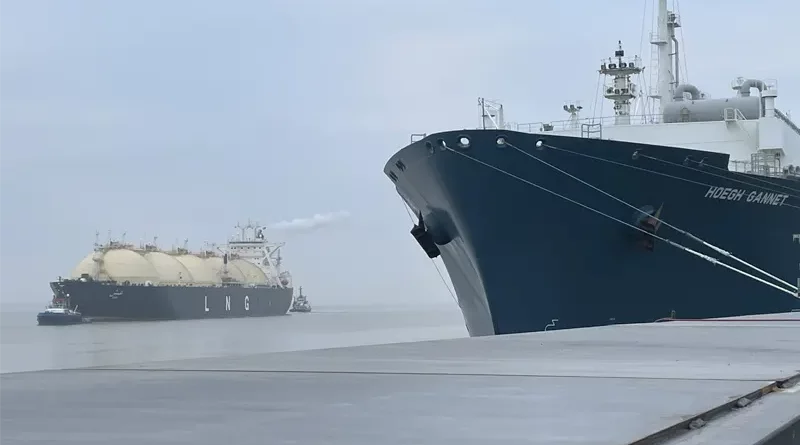First Middle East LNG Cargo to Germany successfully delivered by ADNOC
ABU DHABI: ADNOC and RWE Aktiengesellschaft (RWE) announced today the successful delivery of the first shipment of Liquefied Natural Gas (LNG) from Abu Dhabi in the UAE to the Elbehafen floating LNG terminal in Brunsbüttel, Germany.
Produced by ADNOC Gas at Das Island, Abu Dhabi, the shipment of 137,000 cubic meters of LNG is the commissioning cargo for the new floating LNG terminal in Brunsbüttel and the first-ever LNG cargo to be shipped to Germany from the Middle East.
This landmark cargo follows the inaugural ammonia shipment in October 2022, and furthers cooperation on energy security, decarbonization and lower-carbon fuels between the UAE and Germany.
To mark the successful arrival of the LNG cargo, a ceremonial event was held earlier today in Brunsbüttel, which was attended by Ahmed Alattar, UAE Ambassador to the Federal Republic of Germany; Dr. Alexander Lücke, Deputy Director-General for Energy Security, German Ministry of Economic Affairs and Climate Action; Joschka Knuth, State Secretary in the Schleswig-Holstein Ministry of Energy Transition, Climate Protection, Environment and Nature; Ahmed Alebri, Acting Chief Executive Officer, ADNOC Gas; and Andree Stracke, Chief Executive Officer, RWE Supply & Trading.
Speaking at the event, Ahmed Alebri, Acting CEO of ADNOC Gas, said, “The successful delivery of the Middle East’s first LNG cargo to Germany demonstrates how the UAE is continuing to work closely with our strategic partners in responsibly providing secure, sustainable and affordable energy supplies.
“The global demand for energy is increasing and as we build on the strong economic, energy security and climate action ties between our two nations, ADNOC Gas stands ready to provide further shipments of this key transition fuel to our partner, RWE and German industry.”
The cargo delivery marks an important milestone in developing Germany’s domestic LNG supply infrastructure, supporting the country’s energy security with natural gas. The cargo is sufficient to produce approximately 900 million kilowatt hours of electricity, enough to supply approximately a quarter million German homes for a year.
Andree Stracke, Chief Executive Officer, RWE Supply & Trading, said: “After the arrival of the floating terminal in mid-January, the first LNG delivery from the Middle East is the next important step. The development of the LNG supply infrastructure in Germany continues to make rapid progress. RWE is providing support wherever we are needed. I am pleased that we have ADNOC as a strong partner at our side and that we are working together to make Germany’s energy supply as secure as possible.”
Commenting on the cargo arrival, Stefan Wenzel, Parliamentary State Secretary at the German Federal Ministry for Economic Affairs and Climate Action, said: “Now, more than ever we need to push for a global energy transition, including the diversification of natural gas resources. In the short term, and for the time being, we need more liquified natural gas to arrive at German terminals like here in Brunsbüttel.
“Going forward, we must accelerate the switch from conventional natural gas to green hydrogen and derivates such as ammonia – which has the best chance of success at the European and international level. Internationally, the UAE is a very important partner for Germany, both for liquified natural gas cargos and hydrogen projects.”
The UAE-Germany Energy Security and Industry Accelerator (ESIA) Agreement was signed in September 2022 to accelerate projects of joint interest between the two countries in energy security, decarbonization and climate action. As part of the agreement, ADNOC entered into an LNG supply agreement with RWE, with further cargos reserved exclusively for German customers in 2023.
ADNOC also entered into a number of agreements with German customers, including Steag GmbH (Steag) and Aurubis AG (Aurubis) for demonstration cargos of low-carbon ammonia, a carrier fuel for hydrogen that can play a critical role in decarbonizing hard-to-abate industry sectors

